
5 reasons to create a marketing plan
All of our friends, clients, and potential clients can tell you at least one thing about Uncork-it: we are strong advocates for good marketing plans. We might even be called marketing plan evangelists.
Why are plans so important in such a fast-paced world?
Companies with a marketing plan tend to grow faster and stronger than those who don’t plan. We can see the success of the world’s best marketers, Proctor & Gamble, Apple, Nike, FedEx – all of whom embrace a strong culture of marketing strategy and planning.
But what about smaller businesses? The ones that don’t have billion-dollar marketing budgets?
For small and medium businesses, recent studies show the importance of a plan that is revisited throughout the year. The State of the Business Owner, which interviewed 1,700 business owners in 83 countries, shows some compelling results. The study reports businesses that monitored their brand online and had a marketing plan grew 60% faster than those without one.

Okay, those numbers are interesting. But why does a marketing plan lead to success?
- Creating a marketing plan forces us to look at the situation from different perspectives. We see the big picture by looking at overall numbers and markets, but when we dig into the mindset of our customer groups and explore their challenges and behavior, we are also looking at our products and services through their eyes. Different perspectives feed creative solutions.
- A marketing plan is the perfect tool to keep the whole company on the same page and create common expectations and goals. We have had clients who wrote their marketing plan for the first time, only to realize that they and their partners had wildly different goals. Unfortunately, this can sometimes uncover stress within an organization. The stress was already in place, however, and uncovering that stress means that you have an opportunity to deal with it before it spins out of control.
- A marketing plan keeps marketing costs under control. This happens when a company finds that the same materials can be used in multiple markets with just a few minor tweaks. Such cost savings would not be visible without looking at the whole plan as a whole. Another example of cost savings is that with a plan, marketers know in advance what will happen and can often get lower advance pricing. This eliminates rush charges (and high tensions).
- A marketing plan provides accountability. Stated goals, strategies, and measurements in a plan can be viewed. The marketing team then knows which aspects of marketing to focus on, and must report on successes and challenges. The CMO Survey team reports that when chief marketing officers report having more pressure to prove the value of marketing, their firms have higher financial performance.
- A marketing plan helps balance the marketing load. This sounds simple, but is a big bonus to having a marketing plan. With several quarters or a year blocked out, marketers can see those months where work needing to be done outpaces their team’s capability. This gives them time to shift their timeline and priorities, or engage external marketing partners early enough to be successful.
With a balanced workload, there is also less chance of missing a great marketing opportunity that the team was just too busy to take advantage of in time—maybe a perfect sponsorship, or new advertising opportunity.
Ready to get started? Uncork-it has released a free eBook with five questions to kickstart your marketing plan. Once you’ve answered these five questions, you will be well on your way towards optimized marketing.
If you’re worried about finding time to create your plan, read on!



